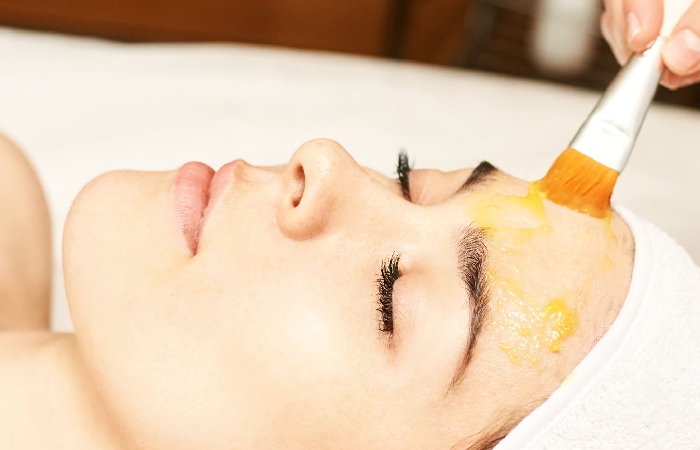Fruit acid is on everyone’s lips. And in our opinion, they also belong (almost) on everyone’s skin! While fruit acids are often only perceived in oily and anti-aging, dry skin can also benefit significantly from glycolic acid and its relatives. Find out here how fruit acids work on dehydrated skin and how you can incorporate them into your care routine.
Table of Contents
Fruit Acid – The Most Important Things In Brief
There are several acids among the fruit acids: the most well-known is undoubtedly glycolic acid, but you have probably also heard of malic, citric, lactic, or tartaric acid.
They all belong to the group of alpha hydroxy acids, also abbreviated as AHA (Alpha Hydroxy Acids). Thanks to their molecular size, they can penetrate very deeply into the skin. But they also bring about skin improvements on the surface.
How Fruit Acids Improve Dry Skin
When hearing the keyword “fruit acid,” many people still think of an aggressive or corrosive effect. Dry skin can therefore also benefit from fruit acids.
Dry skin is tight, often looks parched, and tends to itch. It is due to a disrupted skin barrier that cannot store moisture in the skin.
Fruit Acids Come Into Play Here In Several Places
- Fruit acids stabilize the protective acid mantle and thus contribute to a healthy skin barrier. In addition, it reduces the TEWL and protects against drying out.
- Fruit acids ensure increased water retention so the skin can store more moisture. They also increase the natural moisturizing factors (NMF) in the skin. This hydration is just the thing for dehydrated skin.
- It boosts skin regeneration. It ensures a healthy balance between living and dead skin cells in the epidermis. With the more significant number of living cells, the moisture content in the skin also increases.
- Fruit acids have a peeling effect on the surface. One speaks of a keratolytic result that frees the skin from dead skin cells. It makes rough skin smoother and softer.
Important Information About The Fruit Acid Care Routine For Dry Skin
If you want to include products with glycolic and other fruit acids in your daily care routine, you can “train” your skin, which means a short adjustment phase. In this phase, we recommend applying only 1-2x per week.
Even mild fruit acids can cause a slight tingling sensation on the skin in the first few days or weeks. After that, however, this is nothing to worry about; it shows skin activation.
The tingling will go away over time. However, the effect of the fruit acids naturally remains.
It is also essential to know that creams, lotions, and other care products with AHAs remain on the skin. In addition, fruit acids make the skin sensitive to light, so UV protection is recommended the following day.
Products With Fruit Acid – Our Tips
If you tend to have dry skin and want to add fruit acid products to your care routine, we recommend fruit complex as a night care product. The fruit acid cream is on a particularly gentle formulation with malic and citric acid, containing skin-soothing active ingredients and nourishing lipids. The tingling typical of fruit acid is, therefore, less severe. As a result, even sensitive skin can enjoy the prevalent fruit acids without any worries.
Application – Apply the mild fruit acid cream to the face, neck, and décolleté in the evening after cleansing. Avoid the eye area.
As already mentioned, we recommend daycare with UV protection for the next day. Our tip for everyday life – Hydrating cream SPF 50 is an intensive moisturizing cream with high UV protection that provides ongoing care for dry skin.
UV radiation is more intense in summer, so you should use a dedicated sun protection product. With us, you will find the right product for these requirements with the sun care-sensitive fluid SPF 50+.
Conclusion
Almost every complexion can be improved with care products containing fruit acid – even dehydrated skin. AHAs hydrate, smooth, and renew the skin, contributing to a healthy, beautiful complexion. If you are looking for a particular fruit acid treatment for dry skin, you will usually find it quickly in the cosmetics institute.
